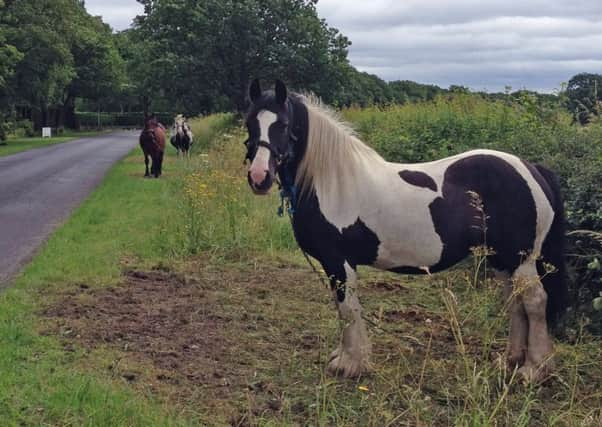Comment: Henry Rowntree


I’m sure most people will have seen the increasing numbers of tethered horses grazing roadside verges and farmers’ fields. From a farmer’s perspective, it is impossible to exaggerate the impact this ‘fly-grazing’ can have on individuals and their families.
Hundreds of farmers across our region are routinely subjected to constant pressure with threats to their property and in many instances, themselves and their families. This illegal trespass varies in severity. At the very least farmers face having their fencing destroyed to make way for large numbers of animals grazing their fields and damaging crops. In some cases though serious threats and intimidation are also endured.
Advertisement
Hide AdAdvertisement
Hide AdI vividly remember hearing a moving account of one farmer’s experiences in the Doncaster area. He felt his family was under real threat and the impact of that kind of stress over many years was clear to see. I find it incredible that this illegal trespass, with threats and intimidation can continue seemingly unabated in our country.
At present, landowners in England have to go through an expensive procedure employing bailiffs to regain possession of their land. But it seems that after years of calling for action to be taken, the authorities are beginning to take notice. In Wales a new law makes provision for animals to be removed speedily or destroyed as a last resort. And new legislation due to be enacted in England will require local authorities to act.
The Anti-social Behaviour, Crime and Policing Act makes provision to protect the community from a range of unreasonable activities and there is specific reference to fly-grazing. At the NFU, we have been lobbying for legislation for many years, working with local authorities and other organisations such as World Horse Welfare, Redwings Sanctuary and the RSPCA to tackle the situation. We have also been working with Defra to find ways of improving the horse passport regulations including the introduction of stricter standards. It is essential that these passports are checked and verified by the authorities so that ownership of the animals can be established and records of veterinary treatment kept.
In the York area there has been a number of road traffic accidents caused by fly-grazed horses – so much so that the authorities have recently acted to remove the animals. But the fact remains that we are seeing ever more of these horses being fly-grazed across our patch.
Advertisement
Hide AdAdvertisement
Hide AdFarmers have made great efforts to protect and enhance the environment and most of us are signed up to agri-environment schemes. This means introducing measures such as ‘margins’ around arable fields that are sown with wild flower mixtures and harvesting hay meadows later in the year. Strict rules apply to these areas, but they are increasingly a magnet for fly-grazed animals. Horses often get loose and can soon cause thousands of pounds worth of damage to crops.
There is a determination to work within the law to stop all fly-grazing and last week NFU Council unanimously passed a resolution from the North East confirming this commitment.
We will continue to lobby politicians of all parties who already support this action until we achieve a satisfactory outcome. Fly-grazing has been with us too long – let’s all work together and see an end to it.
Henry Rowntree is a farmer from Gisburn and is the NFU Council Delegate for the West Riding.